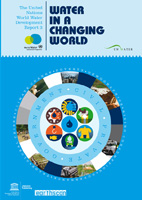
News |
- Climate Accountability Bill Closer to Law
- First Nations Oppose Enbridge Gateway Pipeline
- Ontario Offers Renewable Energy Tariffs
- Canadian Government Cuts CBC Funding
- Canada To Change Environmental Assessment
- Deadline to Save Great Bear Rainforest
- Bottled Water Restrictions
- Ozone Exposure Deadly
- 2008 Protected Areas Efforts Earn Manitoba 'F'
- Innu Oppose Hydro Development in Québec
- Report Warns of Water Shortages
- Cool Cities
| Climate Accountability Bill Closer to Law | 08 April 09 |
 Canada's Climate Change Accountability Act (Bill C-311) cleared an important hurdle Wednesday April 1, 2009 in the House of Commons. Canada's Climate Change Accountability Act (Bill C-311) cleared an important hurdle Wednesday April 1, 2009 in the House of Commons. "The David Suzuki Foundation has been calling for the science-based targets set out in Bill C-311," said Dale Marshall, climate change policy analyst with the David Suzuki Foundation. "This Bill would allow Canada to show leadership in this crucial year for international climate change negotiations, when the second phase of the Kyoto Protocol will be negotiated in Copenhagen," added Mr. Marshall. The Bill requires the Minister of Environment to produce a plan to reach those targets with regular reports to Parliament on progress towards achieving the targets. The passing of the Act was largely thanks to a Liberal motion, which changed the timing of the vote, moving it up the agenda, allowing more Parliamentarians to be present for this crucial vote. The Bill will now go to Parliament's environment committee to be discussed and amended, then it will be sent back to the House for 3rd reading. "To put things in perspective, with only 250 days left before the climate talks in Copenhagen, this Bill will make a strong statement to the international community," said Mike Buckthought, National Climate Change Campaigner at Sierra Club Canada. View April 2, 2009 David Suzuki Foundation releaseView April 1, 2009 Sierra Club Canada release Sources: David Suzuki Foundation, Sierra Club Canada |
|
 Print version Print version |
Top |
| First Nations Oppose Enbridge Gateway Pipeline | 08 April 09 |
 Enbridge Inc.'s Northern Gateway pipeline project faces strong opposition from First Nations and environmental groups. The $4 billion proposed twin pipeline would stretch 1170 kilometers from the tar sands near Edmonton across northern British Columbia to Kitimat, opening up Alberta oil to Asian markets. Enbridge Inc.'s Northern Gateway pipeline project faces strong opposition from First Nations and environmental groups. The $4 billion proposed twin pipeline would stretch 1170 kilometers from the tar sands near Edmonton across northern British Columbia to Kitimat, opening up Alberta oil to Asian markets. The proposed pipeline failed in 2007 partially due to a Carrier Sekani Tribal Council Lawsuit. This time Enbridge has focused on First Nation relations and has tentative support from 25 of the 42 First Nation groups along the pipeline route. Groups including the Dogwood Initiative, Friends of Wild Salmon, the Haida Nation of the Queen Charlotte Islands, and the Carrier Sekani have voiced concerns over the risk of oil spills, increased heavy oil tanker traffic and impact to the salmon industry. Despite Enbridge's efforts First Nation say there has been little meaningful consultation. A resolution passed at the First Nation Summit in November 2008 calling on the federal government to establish an independent First Nation review process. View March 18, 2009 The Epoch Times articleView Enbridge Northern Gateway Pipelines View Route Map - Enbridge Northern Gateway Pipelines View March 30, 2009 Globe and Mail article View February 2009 Newsletter - Council of the Haida Nation (PDF) View Carrier Sekani Tribal Council - Enbridge Gateway Pipeline Project View Dogwood Initiative - First Nations Sources: The Epoch Times, Enbridge Inc., Council of the Haida Nation, Carrier Sekani Tribal Council, Dogwood Initiative |
|
 Print version Print version |
Top |
| Ontario Offers Renewable Energy Tariffs | 08 April 09 |
 Ontario has announced a new system of feed-in tariffs to encourage hundreds of small renewable energy developers to get into the energy market. The province is the first in Canada to offer these pricing incentives and estimates it will add as much as 1,000 megawatts of renewable energy to Ontario's power grid over the next 10 years. Ontario has announced a new system of feed-in tariffs to encourage hundreds of small renewable energy developers to get into the energy market. The province is the first in Canada to offer these pricing incentives and estimates it will add as much as 1,000 megawatts of renewable energy to Ontario's power grid over the next 10 years.A guaranteed pricing structure would be established for renewable energies including solar, wind, hydro, and biomass systems through stable, long-term contracts. The tariffs make it feasible for homeowners, schools, and commercial buildings to install relatively expensive rooftop solar systems and sell back excess power generated. "The proposed feed-in tariff program would help spark new investment in renewable energy generation and create a new generation of green jobs," said George Smitherman, Deputy Premier and Minister of Energy and Infrastructure. The solar energy tariffs, if implemented, will be the highest in North America, making an attractive new market for solar companies. Nanosolar Inc., a California-based company is eyeing Ontario as a location for a regional assembly plant of thin-film solar modules. View April 8, 2009 Greenpeace Canada articleView March 19, 2009 The Star article View March 21, 2009 CTV article View April 2, 2009 Your Renewable News article View March 17, 2009 Renewable Energy World article Visit Nanosolar Inc. website Sources: The Star, CTV, Your Renewable News, Renewable Energy World |
|
 Print version Print version |
Top |
| Canadian Government Cuts CBC Funding | 08 April 09 |
 The Canadian government reduced the Canadian public broadcaster's budget by $63 million for the coming year despite reports of plans to bail out private broadcasters. Lacking in funds, the CBC is still required to fulfill its mandate while facing a $200 million shortfall. The Canadian government reduced the Canadian public broadcaster's budget by $63 million for the coming year despite reports of plans to bail out private broadcasters. Lacking in funds, the CBC is still required to fulfill its mandate while facing a $200 million shortfall. In February of 2009 CBC President Lacroix suggested CBC is looking at options such as "(a) introducing more American programming into our television schedules, (b) downgrading or selling parts or the whole of some or our TV or Radio services, (c) increasing the advertising we accept on the air, or (d) shrinking our geographic coverage of the country by consolidating local stations." Closure of some bureaus, staff layoffs, fewer sports broadcasts, and announcements of fewer episodes of popular CBC TV series are among recent announcements. Decreasing advertising revenue seems to have triggered CBC's situation for the next fiscal year. "We are concerned about CBC's strong coverage of environmental stories being in place for all Canadians. Fluctuations in advertising revenue should not be the factor for access to public broadcasting," commented Gaile Whelan Enns of Manitoba Wildlands. View March 16, 2009 Friends of Canadian Broadcasting - Fact SheetJoin Friends of Canadian Broadcasting - YouTube Channel Join Friends of Canadian Broadcasting - Facebook Group View March 27, 2009 The Star article View March 16, 2009 The Star article View March 20, 2009 Globe and Mail article Sources: Friends of Canadian Broadcasting, YouTube, The Star, Straight.com, Globe and Mail |
|
 Print version Print version |
Top |
| Canada To Change Environmental Assessment | 01 April 09 |
 Recent news reports speculate about the Canadian government's plans to seek "regulatory efficiencies" for projects subject to the Canadian Environmental Assessment Act (CEAA), among other proposed changes. Recent news reports speculate about the Canadian government's plans to seek "regulatory efficiencies" for projects subject to the Canadian Environmental Assessment Act (CEAA), among other proposed changes. Members of the RCEN's Environmental Planning and Assessment (EPA) Caucus are concerned that these new regulatory changes will severely compromise the goals and practices of sustainable development in Canada. In fact, federal environmental assessment provides critical information, and sometimes the only assessment review, on project proposals across the country. In order to inform the public debate about this issue, members of the EPA Caucus are encouraging concerned citizens and groups to consult and share several information documents (linked below), and to express their concerns by sending a letter to the Minister of the Environment. View RCEN EPA Caucus websiteView CEAA Letter to Minister Prentice (DOC) View January 14, 2009 Sierra Club of Canada press release (PDF) View February 2009 RCEN Briefing Note: Weakening Canada's Environmental Protection Law (PDF) View February 19, 2009 EcoJustice Memorandum (DOC) Source: RCEN |
|
 Print version Print version |
Top |
| Deadline to Save Great Bear Rainforest | 01 April 09 |
 In 2006, the British Columbia government announced landmark agreements between environmentalists, logging companies, and First Nation communities to commit to an Ecosystem-Based Management regime and to legally protect from clear-cut logging 2.1 million hectares of the Great Bear Rainforest by March 31, 2009. In 2006, the British Columbia government announced landmark agreements between environmentalists, logging companies, and First Nation communities to commit to an Ecosystem-Based Management regime and to legally protect from clear-cut logging 2.1 million hectares of the Great Bear Rainforest by March 31, 2009.The Great Bear Rainforest is the largest track of ancient temperate rainforest in the world, stores massive amounts of carbon dioxide, and is home to the rare white Spirit Bear, grizzlies and salmon. ForestEthics, Sierra Club B.C. and Greenpeace have launched campaigns to raise awareness and urge the B.C. government to follow through on its commitments. Progress was made December 2008 when the B.C. government announced a proposal for new logging regulations. By the March 31st, deadline the B.C. government must create conditions for: a thriving conservation-based economy; collaborative planning and adaptive management; protected areas not threatened by development. View April 4, 2001 Government of British Columbia press releaseView Greenpeace Canada February 2009 report, Ecosystem-Based Management in the Great Bear Rainforest: Defense for Climate and Species (PDF) View Sierra Club BC campaign: Keep the Promise View Save the Great Bear report, Assessing the Ecological Health of the Great Bear Rainforest View October 23, 2008 Sierra Club press release View Great Bear Watch website - Progress Tracker Sources: British Columbia Government, Greenpeace Canada, Sierra Club, Save the Great Bear |
|
 Print version Print version |
Top |
| Bottled Water Restrictions | 01 April 09 |
 Canadians are taking action against bottled water. The Federation of Canadian Municipalities (FCM) passed an anti-water bottle resolution and is encouraging cities and towns to phase out the sale and purchase of bottle water on municipal property. Canadians are taking action against bottled water. The Federation of Canadian Municipalities (FCM) passed an anti-water bottle resolution and is encouraging cities and towns to phase out the sale and purchase of bottle water on municipal property.FCM is reminding citizens that tap water is safe to drink and is inexpensive. Twenty-eight municipalities from six provinces have voted to restrict bottled water and 21 Canadian universities and colleges have created bottle-free zones. In a recent student initiated referendum at the University of Winnipeg, three-quarters of students voted to eliminate the sale of bottled water on campus. Bottled water will be removed from vending machines and new water fountains will be installed. Advocates say Canada has some of the best public drinking water in the world and bottled water produces unnecessary garbage and carbon emissions. It also takes a lot of energy to produce plastic bottles especially when half end up in landfills. View March 9, 2009 CBC articleView Sierra Club - Bottled Water Campaign View March 7, 2009 Canadian Press article View March 9, 2009 WaterTech Online article View March 24, 2009 Inside the Bottle article View Council of Canadians campaign, Unbottle It! Sources: Inside the Bottle, Sierra Club, Canadian Press, WaterTech Online |
|
 Print version Print version |
Top |
| Ozone Exposure Deadly | 01 April 09 |
 Long-term exposure to ground level ozone pollution can be deadly. A 23-year study of ozone on human health lead by a University of California, Berkeley researcher found that a four percent increase of ozone translates into thousands of deaths each year. Long-term exposure to ground level ozone pollution can be deadly. A 23-year study of ozone on human health lead by a University of California, Berkeley researcher found that a four percent increase of ozone translates into thousands of deaths each year.The study followed nearly 450,000 people for two decades in 96 metropolitan regions. It analyzed the risk of death from two common parts of air pollution - ozone and fine particulate matter. The study found that people living in areas like Los Angeles with high concentrations of ozone had a 25 to 30 percent greater annual risk of dying from respiratory diseases including pneumonia and chronic pulmonary disease than those living in the Midwest where ozone levels are low. Ozone is one of the most widespread pollutants in the world, is formed by a chemical reaction between vehicle exhaust and industrial emissions with sunlight. Authors of the study said the findings justify stronger air quality regulations. View New England Journal of Medicine report, Long-Term Ozone Exposure and Mortality, 2009View March 11, 2009 CBC article View March 12, 2009 Science Daily article View March 12, 2009 Medical News World article View March 12, 2009 Los Angeles Times article Sources: New England Journal of Medicine, CBC, Science Daily, Medical News World, Los Angeles Times |
|
 Print version Print version |
Top |
| 2008 Protected Areas Efforts Earn Manitoba 'F' | 30 March 09 |
 Manitoba Wildlands has released the annual Manitoba Protected Areas Grade and technical assessment. Its actions, or lack thereof, have earned the provincial government a failing grade for 2008. Manitoba Wildlands has released the annual Manitoba Protected Areas Grade and technical assessment. Its actions, or lack thereof, have earned the provincial government a failing grade for 2008.In the year since December 2007, Manitoba experienced a net loss of protected lands. This marks the second year in a row that total lands protected actually decreased. No new boreal forest protected areas were established, and development intentions are proceeding in boreal regions without a protected areas network. Manitoba has one third of the province's regional system of protected areas in place - established during the 1990's - but continues to fail to fulfill its commitments for protected areas establishment. "Manitoba will be hit hard by climate change. We need urgent action in our boreal forest regions and for forest species. Lands planning, World Heritage Site protection, and protected areas before development are all overdue," said Gaile Whelan Enns, for Manitoba Wildlands. The next Manitoba protected areas grade period starts March 2009. BackgroundSee 2008 Protected Areas Grade Technical Assessment, list of Bonus and Penalties, and set of Links. The Manitoba Protected Areas grade is based on government of Manitoba policies, protection standards, regulations, and commitments. Grading criteria have been applied for over fifteen years. The 2008 protected areas Audit was released earlier and is linked below. View Manitoba Wildlands' 2008 Protected Areas Grade Technical AssessmentView MAP 2008 Protected Areas - Manitoba (PDF) View Manitoba Wildlands 2008 Protected Areas - Actions List (PDF) View Manitoba Wildlands 2008 Protected Areas Audit View Manitoba Wildlands Protected Areas Audit - News Item View Manitoba Wildlands Protected Areas Grade page View 2007 Election Manitoba NDP environment commitments (PDF) Source: Manitoba Wildlands |
|
 Print version Print version |
Top |
| Innu Oppose Hydro Development in Québec | 26 March 09 |
|
The Uashaunnuat oppose Hydro Québec's $8-billion, 1,550-megawatt hydro project on the Romaine River. The conflict reflects many lost opportunities across Canada as governments continue to impose their way of resource development on local native communities. "Hydro-Québec does not respect the ancestral rights and titles of the Innu," said Uashaunnuat principal adviser Rosario Pinette. "We are opposed to the Romaine project without our consent. The government has said it does not need our consent but that it will consult with us. That's not enough." Hydro Québec was granted conditional approval from a joint federal-provincial environmental panel and has reached agreements with four other Innu communities, including a $43 million dollar deal over 60 years with the Nutashkuan Nation. View March 12, 2009 Globe and Mail articleView March 11, 2009 Star Gazette article View March 10, 2009 Globe and Mail article View March 10, 2009 Legislative Gazette article Sources: Globe and Mail, Star Gazette, Legislative Gazette |
|
 Print version Print version |
Top |
| Report Warns of Water Shortages | 26 March 09 |
 A report compiled by 24 United Nation agencies assessed the state of our freshwater resources and warns of widespread shortages. The world's finite water resources are being threatened by pollution, climate change, and population growth. A report compiled by 24 United Nation agencies assessed the state of our freshwater resources and warns of widespread shortages. The world's finite water resources are being threatened by pollution, climate change, and population growth.The UN's World Water Development report, Water in a Changing World, was released at the World Water Forum in Istanbul, Turkey. The report says by 2030, nearly half of the world's population will be living in areas of high water stress. Every year the world's population grows by another 80 million. Industrialization, rising living standards, and changing diets that include more water intensive livestock production, place pressure on water resources. Shortages are beginning to constrain economic growth and conflicts over water availability are expected to increase. The report says, "In many places, climate-related water events have become more frequent and extreme." Rising temperatures are melting snow packs and glaciers, a particular concern for more than 15 percent of the world's population that depend on melt waters. View United Nations World Water Development Report: Water in a Changing WorldView March 12, 2009 Globe and Mail article View March 7, 2008 United Press International article View March 11, 2009 Associated Free Press article View March 11, 2009 New York Times article Sources: United Nations, Globe and Mail, United Press International, Associated Free Press, New York Times |
|
 Print version Print version |
Top |
| Cool Cities | 26 March 09 |
 Communities across Canada and the United States are reducing emissions, lowering energy bills and protecting our environment through the Sierra Club Cool Cities program. Cool Cities started in the United States to empower residents and local leaders to take action against global warming through smart energy solutions. Communities across Canada and the United States are reducing emissions, lowering energy bills and protecting our environment through the Sierra Club Cool Cities program. Cool Cities started in the United States to empower residents and local leaders to take action against global warming through smart energy solutions.Canadian Cool Cities make a commitment to stopping global warming by participating. City governments are encouraged to implement energy efficient technology in city buildings, invest in renewable energy, and replace city vehicles with hybrid cars. Cool Cities is launching "Cool Codes" to help the public understand and implement the 2009 International Energy Conservation Code (IECC), which is expected to produce approximately 15 percent in energy efficiency gains compared to the 2006 edition. A Cool Codes Toolkit is available online to help cities adopt the new IECC and Cool Cities has also launched its own YouTube Channel. View January 28, 2009 ICC articleView Sierra Club, Cool Cities Canada View Cool Cities Canada Campaign - Toolkit (PDF) View Cool Cities Canada Campaign - Fact sheet (PDF) View Cool Cities Canada Campaign - YouTube Channel Sources: ICC, Cool Cities, YouTube, Sierrra Club |
|
 Print version Print version |
Top |


 RSS Feeds:
RSS Feeds: